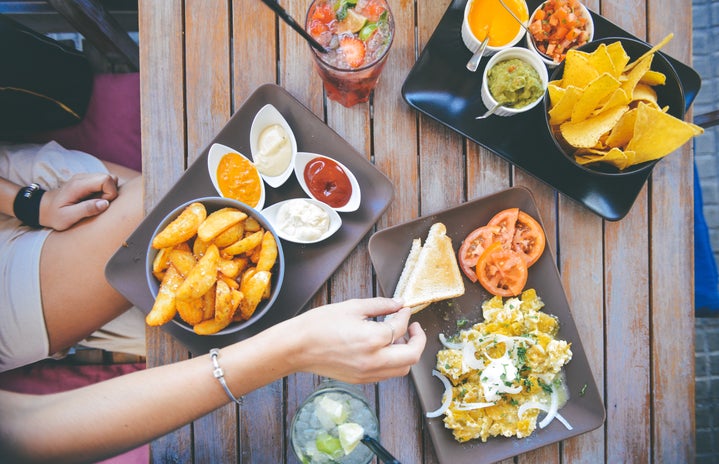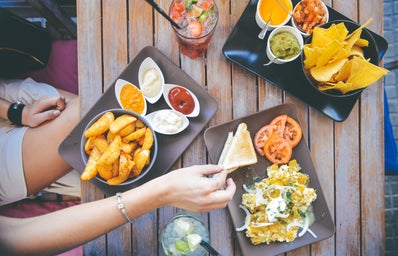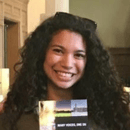My experience with food and bodies through vignettes.
- There is guilt in every bite.
-
Girls are taught that it’s normal to love the things we fear. The rough boys, we’re told, are after our hearts. So when dating, we have to hope that he’ll be the one who—instead of hurting or hitting or raping or slaughtering—will choose to love us instead.
Food is our home and trap, too. The sweets, the sours, the bitter and tangy. They made us feel good when nothing else could, so every girl has her favorites. Obscurely-cut grilled cheese sandwiches. Mint chocolate chip ice cream melted down to a sweet drip. Syrupy pancakes as big as flying saucers. It’s the kind of food the heart craves. But it’s also the kind of food that the mind is reluctant to forgive.
Our refuges can hurt us. They are all too adept at rendering our self-images into less of a woman. They can make us too curvy or not curvy enough, shape us out of the hourglass, give us love handles in place of flat stomachs, and put flesh and bone where long lines and gaps should be. We get told this everywhere, so we start to ask ourselves too: when we eat, what will become of our bodies?
When tasting both men and chocolate, there is guilt in every bite.
- 115
-
She has bangs like a beach babe because he hasn’t told her yet to cut them. Her tummy, the soft flesh of it, peeks out of a pink crop top. It is maybe Hawaii, maybe Miami, or maybe Cancun. The photograph likes to float around loose in our spare drawers, so I grew up finding my mom, young and balmy, in the place of our lost stationary.
I am young when I first find it, itching to be beautiful and leggy and grown like the coveted girl in the picture. When I pass it from my hands to mom’s, though, she won’t give her past self a name. Won’t tell me if that girl meowed and stretched like a cat when she woke up like the woman I’m looking at does now, won’t tell me what boys and love are like when you’re that thin and pretty, won’t tell me how the moment dad fell in love with her was when she looked at the banana trees on a beach in Mexico and decided they weren’t up to snuff. Instead, she gives the girl a number.
“115 pounds,” she tells me, “that’s how skinny I was.” Her hand rests over her stomach now, the curving lines and folds of it where the beginnings of me used to be. “Then, I had you.”
I stare at the picture, and it is a number that sticks. It is a number I give myself, too, because aren’t we supposed to grow up to become like our parents?
115 becomes the line that the scale shouldn’t cross. 115 becomes the goalpost, the dangled carrot. The commissioner, the punisher. When I am fifteen, 115 becomes what feeds me when meals are skipped. It is how hunger makes me proud.
Neither of us can be called 115 pounds anymore—it doesn’t belong to our bodies. But we continue to want the number as our own. In pictures and on scales and in mirrors, mother and daughter look for what’s been lost.
- Veronica
-
There is a girl named Veronica in my third-grade class. She wears her hair in bouncy pigtails, and she’s so chatty she reminds me of a hummingbird. I don’t like her very much, but somehow we always end up sitting across from one another at lunch.
She likes to show the other girls how she measures her wrists and thighs. Her wrists are her favorite body part, she tells me, because her thumb and pinky touch when she wraps her fingers around them. Her thighs are another matter. She can’t interlock her hands around the skin like she wants to, and she isn’t happy with the size of her gap. It isn’t big enough, she says. We are nine years old.
Around her, the girls begin to measure their wrists and thighs too. When I bring skin to skin, mine don’t fit.
The next day, and the day after that, Veronica continues to talk about her body at lunch. Her voice is loud and grating, and she uses it to berate herself. She calls herself fat. Big. Taking up too much space. No one says much back to her. Instead, we just look around at one another.
She is a small stick of a thing. She has a lithe and graceful figure. We exchange glances because with bodies that have just been defined as bulging wrists and thighs, we don’t know what her eyes make of us.
- Jody was always coming from or going to the bathroom. I was never brave enough to ask.
- Chocolate pudding
-
I thought we were too old to take showers together, but we did it anyways.
I was eleven years old, and you were twelve. Like all summers, the time was ours to spend. We stretched muggy afternoons out in my family’s backyard; it felt like our private corner of jungle in a sprawling city, a place that had become senseless to me.
My body was different. While you and I were busy being kids, it had changed quietly and without notice. I got breasts and triangle bras with straps that wouldn’t stay up. My arms and legs had always been dark and covered, but now there was hair growing in places there hadn’t been before. And, I had gotten a tummy. You knew that last one, though. When we went to the beach together, my mom had pointed out the folds of skin. You pretended you didn’t hear her tell me to cover it up, and I was grateful.
My mind was different, too. I had gotten sad and lonely and other things I didn’t know how to name, so I had been eating. Chocolate pudding was my favorite, but vanilla was a close second-best for after school. When our pantry was out, I ate sour cream chips until the salt stung my tongue.
I don’t think either of these changes was a secret. As we undressed, though, I was afraid. Both my mind and body felt alien to me. They were foreign entities, and I didn’t know if I wanted you to see the invasion that had taken place when I wouldn’t look at it myself.
We were in love with the memory of our girlhood, I think. We didn’t want to be friends with boundaries or borders. So we took our last shower together.
You were kind. When you looked at my body, there wasn’t any judgment. You just looked. You were the girl that once told me my curls reminded you of Medusa, a monster of Greek mythology with snakes for hair. But you understood, I guess, that bodies were sacred.
You broke the silence by asking me if I could hold a pencil between my boobs, you know, like in the movies. I remember I laughed and said no. I had never tried it, but I didn’t think so.
When you asked me that, though, I realized that you were looking at how my body had changed and yours had yet to. You were looking at the shape of me, while I was looking at how smooth and pearly your skin was. In my mind, you were clean; I was dirty. But you didn’t see it like that because the body standards we were breaking under went both ways.
I didn’t take a shower with you again after that, and I could tell you found it hurtful. But I knew that there were parts of our girlhood we couldn’t get back.
- Bodies
-
Girls are being molded into bodies that are not always ours. Imitations of ourselves that never gain weight, but when they do—it’s only in all the right places. Because if she has flesh on her, it has to be in a cross-section people can grab and hold onto and service for themselves.
So much beauty and sisterhood exists in colleges, and I’m grateful for that. It’s a context with more diversity of bodies in it than I’ve ever known. But I also think to take back some control in a system where there is little to none—to survive, really, in this war against body and mind—we vy to be the ‘better girl.’ When we talk about our bodies, it’s a persistent game of who is treating theirs the worst. Who is the best at going thirsty, at destroying their diets, at going hungry? Who is the most entitled to feel bad about themselves?
I think it’s second-nature most of the time because it can feel strong to defy what your body wants and needs. It can strike us as a perverted kind of girlpower. But, like the oppression olympics, it doesn’t get us anywhere. Every girl has formative stories like these—belonging either to herself or someone she once knew. Everywhere she turns, she can find ways her shape is either not enough or too much. What a body looks like and how it’s treated is not indicative of the perception within.
A body is a hard thing to love. I don’t think it’s a far reach to say that most of us are failing to do so. And the sooner we realize that commonality, the sooner we can unravel the expectations society places on us and the groups and mediums they originate from.
Love your body.


